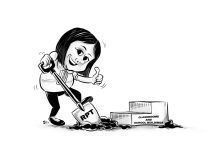
IT STARTS in subtle ways. A student asks for a grade bump because they “tried their best.” A colleague skips a task, saying, “That’s not in my job description.” A driver overtakes in traffic, asserting their urgency is greater than yours.
These seemingly mundane moments reveal a troubling pattern: a growing culture of entitlement that many of us, knowingly or not, participate in and perpetuate. This behavior is not limited to the rich or young — it cuts across all classes, ages, and professions, surfacing in schools, offices, and public spaces. It is not just a quirk but a symptom of deeper societal fractures.
Entitlement is not inherently evil. It is normal to want recognition for effort or fairness in treatment. However, the problem arises when entitlement warps into the belief that one deserves special treatment regardless of merit.
Take the example of young professionals who expect promotions within months of employment, claiming their diploma from a top university entitles them to skip the grind. This mindset often leads to frustration when reality bites back. Studies by Dr. Julie Exline at Case Western Reserve University affirm that inflated entitlement frequently results in unhappiness and strained relationships.
Consider traffic behavior in our cities, where the “me first” mentality dominates. Jeepneys abruptly stop in the middle of the road, private cars encroach on bike lanes, and motorcycles swerve into oncoming traffic. Everyone’s urgency seems paramount, creating chaos. This entitlement to prioritize oneself over others stems from the belief that their time — or frustration — matters more. Such attitudes magnify systemic inefficiencies, reinforcing a cycle of inconvenience and anger.
The family is often the birthplace of entitlement. Well-meaning parents who shield their children from discomfort inadvertently breed adults unprepared for setbacks. For example, a parent who always resolves their child’s school conflicts may instill the belief that authority figures should bend to their will. Over time, this privilege mutates into arrogance.
Research published in Psychological Bulletin highlights how overindulgence in childhood correlates with entitled attitudes in adulthood. Yet, balance is possible — parents can model empathy and teach accountability instead of coddling.
The professional sphere is not immune. Stories abound of employees demanding flexible hours or higher pay without delivering proportional results. Some employees use their credentials or connections as shields, refusing tasks they deem beneath them.
However, these expectations clash with workplace realities where effort and collaboration are valued over entitlement. Many managers can relate to anecdotes of staff questioning their authority simply because they feel superior, often due to personal biases or misunderstandings of workplace dynamics. (To be continued)/PN







